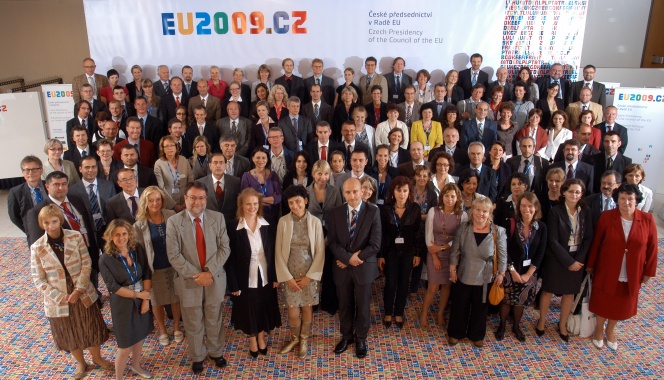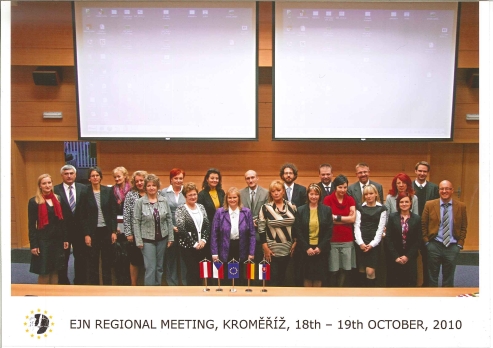The European Judicial Network was created by the Joint Action on establishing the European Judicial Network of 29 July 1998 [1]. This Joint Action was superseded by the Council Decision on the European Judicial Network of 24. 12. 2008. [2]
Its aim is in particular to facilitate judicial cooperation between Member States of the EU, especially in the area of combatting serious crime (organized crime, corruption, illicit drug trade or terrorism) by supporting informal direct contacts between judicial authorities and authorities responsible for judicial cooperation and prosecution of serious crime within the EU Member States.
Each Member State has nominated its contact points for this network. The number of these contact persons fully depends on the decision of each state. For example Austria has 6 such persons, The Netherlands 17, France 44, Italy 58 and Great Britain 22. The Czech Republic is represented by 11 contact points.
The requirement imposed to contact persons is that they must have constant access to the following types of information:
1) complete information on contact persons in each EU Member, including their work position in their respective states;
2) simplified list of judicial authorities and directory of local authorities in each Member State;
3) brief practical and legal information related to judicial and procedural systems in individual Member States;
4) wording of the relevant legal tools and in case of applicable international conventions the wording of declarations and reservations made in respect to such conventions.
Some of the newly prepared legal tools of the European Union, which unambiguously prefer direct legal contact between judges and public prosecutors, directly refer to using the European Judicial Network in order to ascertain, to which judicial authority of the executing state the request should be sent. As such it the authorities involved in criminal proceedings will be obliged to search this information through the contact persons of their state. [3]
The European Judicial Network in particular:
a) facilitates suitable interconnection between contact points in different EU Member States so that it could fulfil its functions – this role is fulfilled in particular by the Secretariat of the European Judicial Network, which was unified with the Secretariat of Eurojust as of 1.7.2003 and now has its seat in Hague;
b) once in every six months it organizes meetings of contact persons, which always take place in the country that presides over the EU (since December 2000, also the representatives of candidate states are regularly invited to these meetings);
c) provides non-stop access to a certain volume of updated information, especially via its website, to which all members have access.
An important role of contact points of this network is to provide necessary legal and practical information to local judicial authorities and to contact persons in other states so that it allowed them to proceed with maximum efficiency when drawing up requests for mutual legal assistance in criminal matters.
Czech Presidency of the European Judicial Network
Within the Czech Presidency of the EU Council the Czech Republic also presided over the European Judicial Network in the First Half of 2009. Between July 24th and 26th, 2009 the Ministry of Justice of the Czech Republic in cooperation with the Prosecutor General’s Office organized a conference and 32nd Plenary EJN Meeting in Prague, which in addition representatives of all EU Member States was also attended by representatives of candidate countries and representatives from Eurojust and the General Secretariat of the EU Council. The scope of the conference was aimed at the identification of certain problems in the area if cross border surveillance of persons, monitoring consignments and international cooperation in interception of communications traffic and finding possible solutions to these problems. Within the framework of the Plenary Meeting the Rules for the Structure of the European Judicial Network and Rules for Regional Meetings of EJN Contact Points were adopted.

The Ministry of Justice of the Czech Republic in cooperation with the Prosecutor General’s Office and the Judicial Academy of the Czech Republic organized the first regional meeting of EJN contact points. The meeting took place in Kroměříž between 17th and 19th October, 2010. It was attended by contact points from Slovakia, Germany, Austria and Czech Republic. The meeting was aimed in particular at issues of international judicial cooperation in cases dealing with recognition of imposed financial penalties and on increasing the effectiveness of cooperation in seizure of proceeds of crime.

EJN contact points for the Czech Republic are representatives of the International Department of the Ministry of Justice and the following public prosecutors of the International Affairs Department of the Prosecutor General’s Office:
JUDr. Světlana Kloučková, Ph.D.
Mgr. Danuta Koné-Król
JUDr. Přemysl Polák, Ph.D.
[1] Joint Action of 29. June 1998, adopted by the Council on the Basis of Article K.3 of the Treaty on the European Union and Establishing the European Judicial Network (98/428/JHA) – Off. Journal L 191, 7. 7. 1998, p. 4.
[2] Council Decision 2008/976/JHA of 16. December 2008 on the European Judicial Network (Of. Journal L 348, 24. 12. 2008, p. 130)
[3] E.g.: art. 4 (3) of the Council Framework Decision 2003/577/SVV of July 22. 2003 (OF. Journal L 196, 2.8.2003, p. 45).
